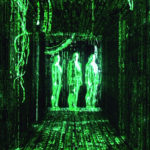Reason’s Bunker: The One-Sidedness of the Modern Mind
by Martin Dober
Filed under Man
St. Justin Martyr, a second century philosopher and Christian apologist, once reflected that Platonic philosophy added “wings” to his mind.1 He was referring to the way that Plato’s theory of ideas freed his reason, allowing his thoughts to rest not just upon the sensible things of this earth, but rather permitting him to contemplate the unseen yet essential realities that undergird and give meaning to all of existence.
Justin is a witness to the way that truth can lift our minds and let us soar to the heights of wisdom. However, according to Pope Benedict XVI, the prevailing approach to truth today resembles a windowless bunker more than it does the freedom of a bird soaring in open skies.2
We are an intellectually one-sided society. While we pride ourselves (and rightly so) on the great achievements we have made in the fields of science, especially the trifecta of biology, physics, and chemistry, we have forgotten what St. Justin Martyr and other great thinkers like St. Augustine knew so well and found so life-giving: truth is much broader, deeper, higher, and richer than mere scientific fact.
Today we are guilty of thinking that the highest form of truth is data. This mentality is evident in our informal conversations and can be especially found in the works of the New Atheists like Richard Dawkins, who, for example, reduces the intellectually fruitful idea of human love to a chemically-induced brain state.3
We are more dedicated to dividing things into their smallest quantifiable units than with learning what they mean as a whole.
This is the bunker into which we have put ourselves, a myopic view of human reason that considers scientific certainty and practicality alone to be worthwhile and valid, while all other modes of thought, like philosophy and theology, are considered to be ambiguous and inconclusive enough that it is better not to waste time with them anyway.
Our understanding of reason’s scope is severely limited. We have a concrete roof over our heads that prevents our minds from rising to contemplation of God, and at the same time the walls of our bunker shield us from the deeper questions of meaning that constantly assault our consciousnesses, justly demanding our attention. But how did we get into this intellectually intolerant, close-minded bunker mentality? And, more importantly, how do we get out?
How We Got into the Bunker
Probably one of the single most significant intellectual events of human history was the 18th century Enlightenment, which brought about a number of exciting advances in the technological fields and opened up broad new avenues of scientific exploration. But the Enlightenment was also the point at which human thought began taking decisive steps down the stairway which leads to the bunker of reason that we live in today.
Especially under the influence of Rene Descartes, thinkers like David Hume and, later, Auguste Comte, declared the age of “speculative thought” (metaphysics and theology) at an end; they considered themselves the harbingers of a new age of the primacy of science. Science, they said, was at last gaining the competency to adjudicate moral matters and provide direction for man’s true purpose: the mastery of nature and of himself. Each of these three thinkers represents a step further down into the bunker of restrictive reason in which we live today.
Descartes’ rationalism is a constitutive piece of Enlightenment thought and is one of the first steps into today’s bunker of reason. He advocated the “practical philosophy” of math and science with the aim of making men “lords and masters of nature”.4 Descartes prized the role of human thought more in its capacity for making than for meaning.
Then, in a philosophical move sometimes known as “Hume’s fork”, Scottish Enlightenment philosopher David Hume took human thought on a second step into the bunker of reason when he argued that all the objects of human reason or enquiry can be divided into two kinds, “Relations of Ideas” and “Matters of Fact”. The former category contains the sciences of geometry, algebra, and arithmetic. The latter category contains synthetic propositions based on experiences to which one is accustomed, such as, “The sun will rise tomorrow.”
However, all Matters of Fact are dependent upon relationships between cause and effect, and Hume holds the skeptical position that there is no real logical necessity that certain observed effects will always come from associated causes. Therefore, according to Hume, there is in fact no real way of knowing anything other than the first category of reason, the sciences.5 Hume is one of the founding fathers of empiricism, an approach to human reason that says that truth can only be found when there is empirical (sensible) evidence to apprehend.
Aided by the growing influence of the intellectual trends of the Enlightenment, a third and decisive step into the bunker of reason was taken by the 19th century French thinker, Auguste Comte. Comte proposed what he called “positive philosophy”, an approach to reason which recognizes as truthful only those pieces of knowledge that are positive facts. For Comte, logic is the sole vessel of truth.
Comte claimed that the history of human thought moves through three general states. First, there is the theological state, then the metaphysical, and finally the positive state. It is only in the third state that humans can actually be said to have knowledge and get at the truth.6 Theological and metaphysical ideas belong to an age when humans didn’t know any better and basically made up ideas about the universe since they were without the aid of science.
According to Comte, theology is the innocent but ignorant childhood of the human mind, while metaphysics represents the slightly more serious—though no less empty—youth of human thought. And the positivistic approach to reason is, of course, adulthood, human reason come to full stature. Comte concludes, “All competent thinkers agree with [Francis] Bacon that there can be no real knowledge except that which rests upon observed facts.”7
With this succession of thinkers, human thought has been gradually narrowed down such that it consists only of science and logic when it once was directed to responding to questions of ultimate meaning. We have entered the bunker of empirical fact and slammed the door shut behind us, sealing ourselves off from thoughts of heaven and from any type of rationally inquiry that does not yield factually certain results.
How We Can Get Out of the Bunker
The first step necessary for getting out of the bunker of restrictive reason is to realize how the thinkers who got us in here are wrong.
Therefore, when looking at the conclusions of the rationalists, skeptics, empiricists, and positivists, we should ask: is this really the great achievement of human reason—that it is no longer concerned with anything but dry facts? Can science really answer all of man’s exigent questions? Are all non-scientific questions ultimately meaningless or unanswerable?
In truth, the life of every man and woman is marked by questions and challenges that are deeper and of far greater significance than practical questions of science and math. Questions about the meaning of death, love, and the existence of God are part of the heritage of human thought not because pre-historical humans did not have modern scientific tools but because these questions belong to human nature and thus stretch across the boundaries of time.8
By emphasizing practical thought over reflective thought, Descartes and his successors displaced certain important human questions. For example, the meaning of death used to be an important point of reflection for humans, but today death is often just thought of as a biological fact. Yet, those who are committed to intelligent, contemplative thought about human existence cannot let such a significant reality be swept aside so easily. After all, death is not just a biological phenomenon irrelevant to human meaning but is, in the words of Pope Benedict, a “human phenomenon of all embracing-profundity.”9
Death raises questions of human purpose: Why must we die? Does anything happen after death? How do I interpret the death of a loved one? These questions occupy our thoughts; they define our relationships with others, the scope of our plans, our sense of meaning in life, and thus our very existences. So to offhandedly reject death’s philosophical and theological relevance as we often do today is intellectually reprehensible.
Hume and Comte put all their trust in empirical data and the pure objectivity of the rational subject, but one must have pre-scientific notions of truth before one can trust empirical facts. G.K. Chesterton writes, “Reason is itself a matter of faith.”10 That is, I only trust that empirical facts are true because I believe that I am capable of knowing the truth. This conclusion is not scientific but philosophical. So there is a priority of philosophical—even creedal—truth over empirical fact. The former precedes the latter and cannot be blithely ignored.
Philosophy must ground science and oversee it, or else science becomes detached from questions of meaning and its own purpose. The reflective question, “What is truth?”—and all that comes with answering it—is deeper than the fields of biology, physics, and chemistry, since our work in those scientific fields must be grounded in our understanding of truth and the meaning of our endeavors.
How many of us today spend any amount of time considering the attainability of truth and other questions of meaning? Perhaps we remain in the bunker of safe, certain, scientific reason and neglect such questions simply because they are hard to resolve. Or perhaps it is because modern technological means can provide us with thousands of answers to these questions. And the plurality of available answers is almost overwhelming enough to cause one to believe that there simply are no answers and that he or she must choose a path arbitrarily or ignore questions of meaning entirely. We sometimes think, “If no one can agree on it, there must be no good answer.”
However, when tempted by this intellectual apathy, perhaps we can learn from St. Justin Martyr, who not only found liberation in discovering answers to many of his questions but was pushed to seek for truths even deeper than Platonic philosophy. And he eventually found them.
In Laudato Si, Pope Francis shows us how we can begin to follow the path of St. Justin and free our minds from the bunker of restrictive scientific reason. He writes that we must refuse to resign ourselves to the dull, calculative approach to the world that prevails today and must instead “continue to wonder about the purpose and meaning of everything.”11 To be really human is to wonder at the meaning of our lives and the beauty and tragedy that surrounds us. Wonder bursts the prison of calculative reason and sets before us the exhilarating questions of human existence: “Who am I?” “Why do I exist?” “Where am I going?”
This blog post is not the place to offer answers to man’s great questions of meaning, but it is the place for me to urge you not to believe the lie that there are no answers to be found. These questions don’t belong to just a certain body of “intellectuals” but to every man and woman. So let’s allow ourselves to be awash in wonder at everything that is incalculable in human life and reclaim the place of reflective thought. Let us together step out of the bunker of restrictive reason and into the light of day, stretch our wings, wonder, seek, and find.
Related Posts
Notes:
- St. Justin Martyr, Dialogue with Trypho, ed. Michael Slusser (Washington, DC: The Catholic University of America Press, 2003), 6. ↩
- Pope Benedict XVI, “How Do We Find Our Way Into the Wide World?” Address to the German Parliament (Bundestag), 22 September 2011, 8. ↩
- Richard Dawkins, The God Delusion, 1st Mariner Books ed. (Boston: Mariner Books, 2008), 215. ↩
- Rene Descartes, Selected Philosophical Writings, translated by John Cottingham, Robert Stoothoff, and Dugald Murdoch (Cambridge: Cambridge University Press, 1988), 47. ↩
- David Hume, An Enquiry Concerning Human Understanding; [with] a Letter from a Gentleman to His Friend in Edinburgh; [and] an Abstract of a Treatise of Human Nature, 2nd ed. (Indianapolis: Hackett Publishing Company, Inc., 1993), 15-16. ↩
- Auguste Comte, Introduction to Positive Philosophy (Indianapolis: Hackett Publishing Company, Inc., 1988), 2. ↩
- Ibid., 4. ↩
- In fact, the continual relevance of these questions over time stands on its own as a sort of argument for the fact that there is a universal human nature. ↩
- Joseph Ratzinger, Daughter Zion: Meditations On the Church's Marian Belief (San Francisco: Ignatius Press, 1983), 79. ↩
- G. K. Chesterton, Orthodoxy, Reprint ed. (San Francisco: Ignatius Press, 1995), 38. ↩
- Pope Francis, Laudato Si, 113. ↩
Note: Our goal is to cultivate serious and respectful dialogue. While it's OK to disagree—even encouraged!—any snarky, offensive, or off-topic comments will be deleted. Before commenting please read the Commenting Rules and Tips. If you're having trouble commenting, read the Commenting Instructions.













